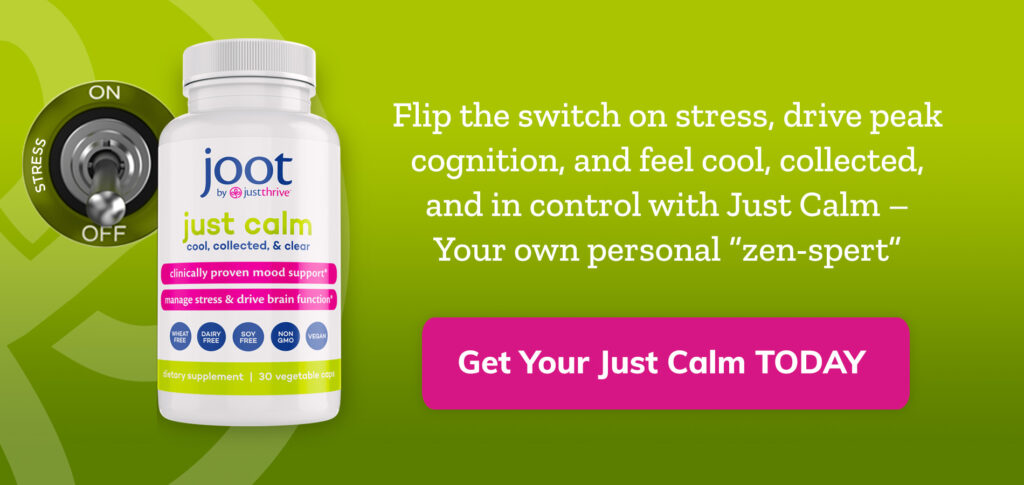Table of Contents[Hide][Show]
Almost everyone has felt anxious at some point in their lives.
Modern life requires an incredible amount of juggling, balancing, analyzing, and deciding… often with time and financial constraints.
Whew!
It’s no wonder that so many people are experiencing anxiety.
And while it would be ideal to avoid situations that make you anxious, it’s simply not always possible.
But even if you can’t avoid your anxiety trigger, you can still manage your anxiety.
And one of the simplest, most effective ways to do this is something you might not have thought of.
Gratitude.
Let’s take a closer look at how practicing gratitude can help you reduce your anxiety.
What Is Anxiety?
Before we explore the link between gratitude and anxiety, let’s take a closer look at what anxiety is… and what it isn’t.
The word “anxiety” is used frequently, and with good reason.
Anxiety is the most common mental illness in the U.S., affecting more than 40 million adults. That’s over 19% of the population!
But what exactly is anxiety?
According to the American Psychological Association (APA), anxiety is an emotion that is identified by mental symptoms such as feeling tension or worry and physical symptoms such as increased blood pressure.
In other words, anxiety is your emotional, mental, and/or physical response to a stressful or worrisome situation—also known as a stressor or trigger.
For example, you might feel some anxiety when faced with social situations, major events, and school or work evaluations. Having to make an important, even life-changing, decision can also cause you to feel anxious.
Your body’s initial response is to feel stress to an external trigger. Anxiety is your reaction to stress, an internal trigger.
For the most part, once the stressor is in the past, your stress will fade away. Your anxiety, however, can remain.
Related
Managing Stress and Anxiety
What’s the difference between stress and anxiety? Learn the symptoms and triggers of each to identify which is affecting you, the link between your gut and mental health, and how to overcome them.
Anxiety Disorders
In some cases, the duration or the severity of your anxiety might be much greater than its trigger seemingly calls for. This usually manifests additional physical symptoms, such as insomnia or digestive issues.
If this happens and anxiety begins to disrupt your daily life, it is now considered to be an anxiety disorder.
The most common anxiety disorder is Generalized Anxiety Disorder (GAD). Others include panic disorders, phobias, and separation anxiety.
Signs of Anxiety
It’s normal to worry. So how do you know when your regular levels of worry or concern are crossing into anxiety?
Here are some of the most common symptoms of anxiety.
Physical Signs Of Anxiety:
- Cold or sweaty hands, clammy palms
- Dry mouth
- Headaches
- Heart palpitations
- Muscle tension or aches
- Nausea
- Numbness or tingling in your extremities
- Shortness of breath
Mental Signs Of Anxiety:
- Feelings of panic, fear, unease, and dread
- Flashbacks or repetitive thoughts of traumatic experiences
- Nightmares
- Obsessive thoughts
Behavioral Signs Of Anxiety:
- Inability to sit still
- Insomnia or other sleep issues
- Ritualistic behaviors, such as repeated hand washing or having to check the door lock a specific number of times
Every person experiences anxiety differently, and every episode of anxiety is unique.
You may not feel all of these symptoms. Also, different triggers can manifest different symptoms or the same symptoms but with a different intensity.
What Is Gratitude?
November is National Gratitude Month, and it’s no wonder. After all, our biggest opportunity to show gratitude occurs in November: Thanksgiving.
Many people have special traditions throughout the month, from creating a “gratitude jar” to be shared at the Thanksgiving table to finding something unique for which to be grateful every day of the month.
But what exactly is gratitude, and how does it differ from thankfulness or appreciation?
While all three concepts are incredibly similar, they do differ.
- Appreciation is external, directed at another person or a circumstance. You appreciate the value (not necessarily financial) or beauty of an action, object, or person. For example, you can appreciate a gorgeous sunset or you can appreciate a meal cooked for you by a friend.
- Thankfulness, on the other hand, is internal. It’s an emotion, a temporary reaction to an external event. You might feel thankful to that friend who cooked your dinner, for example. Eventually, thankfulness fades.
- Gratitude is also internal, an attitude that you choose regardless of the situation. It combines being appreciative with being thankful, even when nothing particularly good or exciting has occurred. It may start out as thankfulness, as in the example above. But after that moment of thankfulness and the appreciation of the meal are past, gratitude remains and fosters a deeper connection with that friend.
Gratitude encompasses physical and emotional contentment, and it is a long-term decision that comes from your inner voice.
In other words, your “attitude of gratitude” is a state of mind!
Benefits of Gratitude
Other than making you feel happier and more satisfied with your life, gratitude has powerful, proven benefits.
Along with reducing anxiety, which we’ll explore next, here are some of the positive results of practicing gratitude.
- Decreases depression
- Enhances empathy
- Improves immune system response
- Improves mood, by reducing negative emotions such as envy and increasing positive emotions such as happiness
- Increases self-esteem
- Reduces physical aches and pains
- Strengthens relationships with others
In addition, studies show that practicing gratitude supports heart health by lowering your blood pressure and promotes your overall well-being by reducing inflammation.
Related
The Relationship Between Happiness, Your Gut, and Psychobiotics
Find out how the gut-brain connection affects your mood, what psychobiotics are, and how to get more of them so you keep your brain happy.
How Gratitude Helps with Anxiety
We’ve seen that gratitude can provoke positive emotional and physical results.
But can something as simple as gratitude really help with all of the anxiety symptoms we mentioned earlier?
You bet!
Let’s look at some of the ways in which gratitude can help you overcome anxiety.
Gratitude Lowers Stress
Remember earlier, how we mentioned that anxiety is a response to a stressor?
Because of that close link, one of the most effective ways in which gratitude helps you overcome anxiety is by lowering the level of cortisol, the “stress hormone.”
Under stress, part of your body’s “fight or flight” response includes the release of additional cortisol. In stressful situations, our elevated cortisol level has positive results, such as keeping your mind and body on high alert and ready to respond.
However, sometimes stress can last longer than usual. For example, you might be feeling financially stressed for several months in a row. The consistently high cortisol level can cause your stress to spiral and your body replies with anxiety.
Studies show that practicing gratitude lowers cortisol levels. This has a positive domino effect, lowering stress, which then lowers or even eliminates anxiety.
Gratitude Provides A Different Response
Constant worrying can lead to stress and anxiety. But it can be challenging to escape rumination, a constant, endless loop fixated on negative thoughts.
Gratitude can help you break out of that cycle of negative thinking by providing a different, positive point of view.
For example, instead of worrying about a big presentation at work, you can be grateful for the co-workers who helped you pull it together, your supervisor for trusting you to do a good job, and the opportunity to gain recognition and growth in your field.
In this way, gratitude functions as a form of Habit Reversal Training (HRT), in which a habit you’re trying to break is offset by a competing habit. In this case, you’re breaking out of the habit of negative, stressful, anxious thinking and replacing that with thoughts of gratitude.
Gratitude and anxiety are competing for your mind’s attention. When you choose to focus on gratitude, you leave little time or energy for the stressful thoughts that lead to anxiety.
Gratitude Helps You Sleep Better
Poor sleep isn’t just one of the symptoms of anxiety. It’s also one of its causes!
More and more studies show the negative impact of poor sleep on your overall health, and that includes your emotional health.
Simply put, if you aren’t well-rested, your brain isn’t well-rested, and it’s more challenging to deal with the most minor stressors and anxiety triggers.
It might seem like a never-ending cycle. Poor sleep = anxiety = more poor sleep = even more anxiety.
But gratitude can disrupt that cycle!
Research shows that people who practice gratitude get better sleep, both in quality and duration. This makes it easier for you to experience daily, minor stressors without feeling the kind of long-lasting, disproportionate response that can lead to anxiety.
Simple Ways to Show Gratitude
Clearly, gratitude can help you curb anxiety.
So what can you do to cultivate a grateful mindset?
Here are some easy ways you can practice and improve your mental health every day.
- Begin each day by thinking about what you feel grateful for, before the day has even begun.
- Vocalize your gratitude. It may feel silly, but speaking and hearing the reason why you feel grateful may be more impactful than just thinking about it.
- Keep a gratitude journal.
- Share your gratitude with others, either verbally or in writing. Let them know when you are grateful for something they’ve said or done.
- Set an alarm on your phone to remind you to stop during the day and find reasons for gratitude.
- Add gratitude to your meditation by focusing on specific people, things, or situations you feel grateful for.
- End each day by recalling at least one moment in your day that makes you feel grateful.
Support a Health Stress Response With Psychobiotics
You can also support your gratitude practice with a psychobiotic supplement.
Psychobiotics are formulated using probiotic (beneficial) bacteria that support your mental and emotional health, including your mood and stress response.
We highly recommend our favorite psychobiotic supplement, Just Calm by Just Thrive. It pairs 3 brain-nourishing B vitamins with the proprietary “psychobiotic”, researched, and scientifically verified strain, Bifidobacterium longum 1714™. Just Calm has been shown to help manage stress, promote vitality, support better sleep, and lower cortisol levels. The best part? It’s backed by Just Thrive’s Bottom of the Bottle, 100% money back guarantee. If for any reason you’re not satisfied, simply request a full refund at any time—no questions asked!
Final Notes
Millions of people experience anxiety every single day, and that’s okay. But it shouldn’t ruin your mood, negatively impact your health, or disrupt your otherwise happy life.
With its positive physical, mental, and emotional effects, practicing gratitude can help you leave stress behind, overcome anxiety, and manage your emotional state.
Your “attitude of gratitude” will change your life for the better!
You May Also Like…






